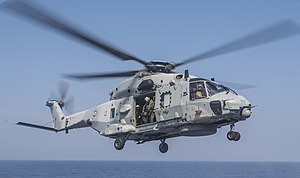
Back إن إتش-90 Arabic NHIndustries NH90 Azerbaijani NHIndustries NH90 Catalan NHIndustries NH90 Czech NHI NH90 Danish NH90 German NHIndustries NH90 Spanish NHIndustries NH90 Estonian اناچاینداستریز اناچ۹۰ Persian NHIndustries NH90 Finnish
| NH90 | |
|---|---|
 A French Navy NH90 | |
| General information | |
| Type | Medium utility military helicopter |
| National origin | Multinational |
| Manufacturer | NHIndustries |
| Status | In service |
| Primary users | Italian Armed Forces |
| Number built | 515 as of March 2024[1] |
| History | |
| Manufactured | 1995–present |
| Introduction date | 2007[2] |
| First flight | 18 December 1995 |
| Variants | NHIndustries MRH-90 Taipan |
The NHIndustries NH90 is a European medium-sized, twin-engine, multirole military helicopter. It was the first production helicopter to feature entirely fly-by-wire flight controls.[3] There is extensive use of composite materials and electronic sensors. The helicopter has two main versions, the TTH oriented towards land applications (able to carry up to 20 troops) and the NFH, oriented towards naval use and focused on such tasks as ASW and marine SAR. Over 500 have been produced for a dozen users, and it remains in production.
The NH90 was developed in response to North Atlantic Treaty Organization (NATO) requirements for a battlefield helicopter which would also be capable of being operated in naval environments. It was developed and is manufactured by NHIndustries, a collaborative company owned by Airbus Helicopters (formally Eurocopter), Leonardo (formerly AgustaWestland), and Fokker Aerostructures. The first prototype conducted its maiden flight in December 1995; the type first entered operational service in 2007. As of June 2022, the NH90 logged 327,053 flight hours in the armed forces of thirteen countries.[4] It is an advanced but high maintenance military helicopter employed by a dozen countries in two major versions. It has a naval version that can land on ships and is used for sea rescue and submarine warfare, and an army version that has been used for transporting cargo, people, medivac, and special operations.
The NH90 has two main variants: the Tactical Transport Helicopter (TTH) for army use and the navalised NATO Frigate Helicopter (NFH); each customer typically has various alterations and customizations made to their own NH90 fleets, such as different weapons, sensors, and cabin arrangements, to meet their own specific requirements. In addition, local construction of airframes was accommodated in many cases, giving participants in the program a chance to develop experience in construction. However, despite many advanced features, there have been a series of complaints about the overall experience, including delays in delivery, high maintenance, software issues, and durability, leading to the early retirement of some fleets. Nevertheless, it has served in increasing numbers and roles in the 2010s, taking on naval search and rescue, ASW, troop transport, special operations, various resupply and disaster relief, and medical evacuation. In several cases, NH90 variants can be quite specialized towards a certain role.
Since its introduction into service, the NH90 has suffered several technical issues, which have delayed active deployment of the type by some operators. It is a key next-generation helicopter for many NATO countries: some have opted to stick with the type while others have chosen to discontinue operations. In 2022, Norway terminated the program and demanded a full refund. Australia withdrew the type in 2023, well ahead of the planned retirement date of 2037. Currently in the mid-2020s, a dozen countries continue to use the NH90, while additional orders and improvements equate to ongoing and widespread use of the type. Efforts are ongoing to increase roles, upgrades, and increase the service life and ease of maintenance.[5][6][7]
- ^ Cite error: The named reference
:6was invoked but never defined (see the help page). - ^ Sgarlato, Nico (April 2008). "Gli NH-90 dell'Esercito". Aeronautica & Difesa (in Italian).
- ^ Perry, Dominic. "Rotor club: Our top 10 most influential helicopters." Archived 2014-11-24 at the Wayback Machine Flight International, Flight Global, 21 November 2014.
- ^ "NH Industries". Retrieved 19 June 2022.
- ^ Centeno, Gabriel (2 October 2023). "Australia retires 40 NH-90 helicopters early". Aeroflap.
- ^ Centeno, Gabriel (5 November 2022). "Sweden wants to replace its NH90 helicopters with the UH-60 Black Hawk". Aeroflap.
- ^ Perry, Dominic. "NHI chief dismisses NH90 safety fears in wake of Australian decision, as dialogue with Sweden continues". Flight Global. Retrieved 16 October 2023.